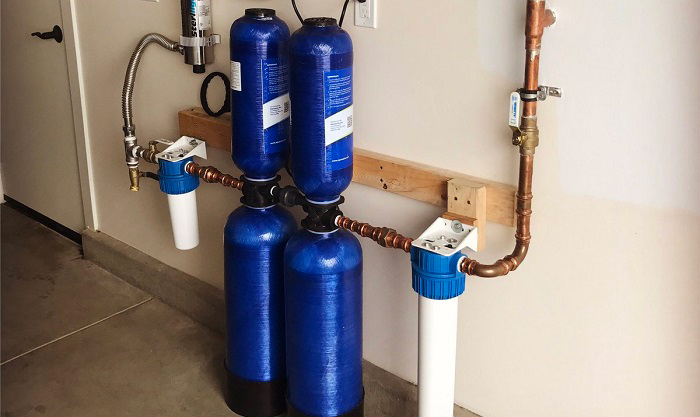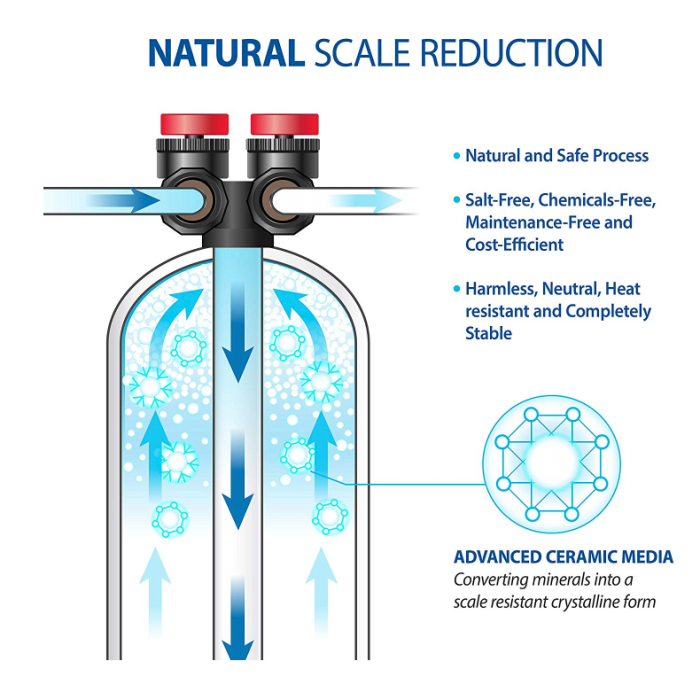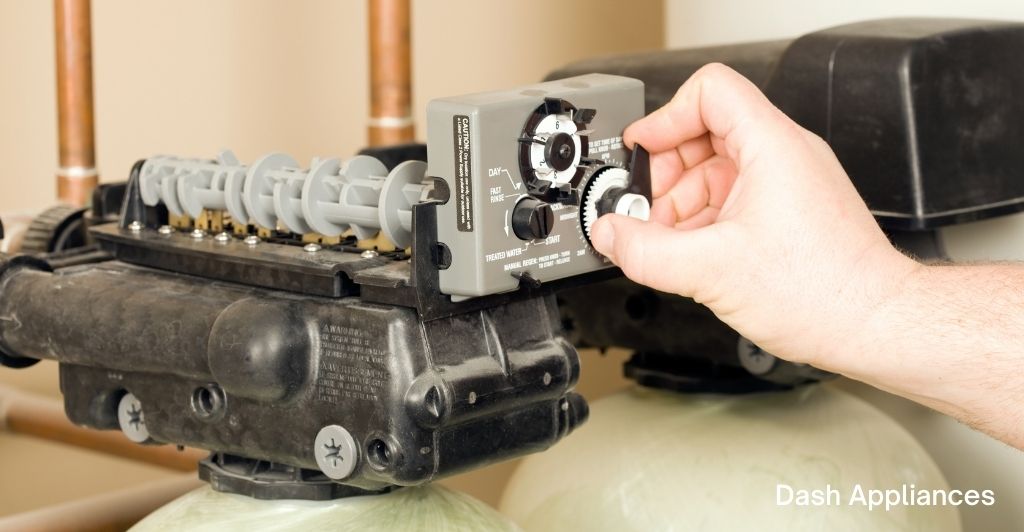A water softener is a device, which acts as a filter for your water. The filter uses a combination of chemical and physical processes to filter out the dissolved salts in your water.
The most common type of water softener is the ‘ion exchange’ softener that uses an ion exchange resin, which adsorbs calcium and magnesium ions. The process is then reversed, and calcium and magnesium ions are released back into the water to form new calcium and magnesium ions.
What is a Salt Free Water Softener?
Salt-free water conditioning systems use ionic minerals in a process called electrolysis to remove minerals and other impurities from water. The most common ions used in water conditioning systems are magnesium and calcium.

Water softeners are devices that remove hard water scale buildup (and sometimes other minerals) from your water by using a softening agent to break up these mineral deposits.
The main minerals that hardness causes are calcium and magnesium, so the process usually starts with the use of an ion-exchange resin to remove these minerals. The softener then uses other ion-exchange resins, so the process continues to remove calcium and magnesium, along with other minerals that it has captured.
How Does a Salt Free Water Softener Work?
A salt free water softener is any water softener that does not contain salt. There are many types of salt free water softeners on the market, each with its own advantages and disadvantages. One drawback of salt free water softeners is that they are often more expensive.
A water softener is a home piece of hardware that uses a salt-free system to remove minerals from hard water. It can be a great solution for hard water regions where hard water is a problem.
Salt Based Water Softeners vs. Saltless Water Softeners
If you have a hard water stain on your white ceramic tile floor, you will want to look at a salt-based water softener to help reduce this problem.
There are many types of water softeners, but a salt based water softener will use salt as a medium to soft water by requiring a small amount of salt to be added to the water. A saltless water softener will not use salt as a medium.

The popularity of salt-based water softeners has doubled in the last 5 years, and today, there are over 400,000 units installed in the USA. Many of these units offer a salt-free alternative, which removes the need for salt and reduces the amount of added sodium in the home.
The use of salt-free water softeners is now commonly recommended for people who want to control the amount of salt added to the water but also want to maintain the softness of the water.
Pros and Cons of Salt Free Water Softener
Pros:
- It removes the hardness minerals in the water
- It outdoes the salt-free system
- It has no scaling on its fixtures
- It is bright
- It hydrates skin
- It gives spot-free dishes
- It is bright and soft for clothes
- And you will use less soap
Cons:
- It is expensive
- It requires maintenance
How Effective is Salt Free Water Softeners?
Did you know that water softeners can cause more harm than good? Why use a water softener if you’re not even able to taste the salt? Why use a water softener if you’re not even aware that you have one and never even consider the fact that the water coming out of your faucet is already soft?
The benefits of salt-free water softeners are many, but there are some major drawbacks. Most of us use water softeners for protection against hard water. This softens the water by removing the mineral content, making it less abrasive when washing clothes or dishes.
Salt free water softeners are a popular choice for people who want to soften their tap water without using salt. And while it’s true that you can soften water without salt, many people don’t realize that there are significant downsides to salt free water softeners.
Many people don’t realize that buying a salt-free water softener will cost them money since it is more expensive than regular water softeners. Often the water softener will need regular maintenance, which will require the user to have a hard water system on their home.
Do Salt Free Water Softeners Remove Iron?
Salt free water softeners are a popular choice for people who want to soften their tap water without using salt. And while it’s true that you can soften water without salt, many people don’t realize that there are significant downsides to salt free water softeners.

Many people don’t realize that buying a salt-free water softener will cost them money since it is more expensive than regular water softeners. Often the water softener will need regular maintenance, which will require the user to have a hard water system on their home.
Water Softeners are devices used to remove unwanted particles from the water after it has been softened. These can be at home or installed in a residential or commercial property. They are very commonly used in the UK but are quite expensive.
However, there are many ways of cutting the cost of this vital chemical without compromising on the quality of the water. This article will explain how you can save money on your water softener whilst increasing your water quality.
How Long Does a Salt Free Water Softener Last?
The softening process of water is vital to our skin and hair health, but just how long do water softeners last? Some claim that they last forever, others that they only last a few years, and still others that they can’t handle salt or calcium.
The truth is, there isn’t a set timeframe, but research has shown that softeners aren’t effective indefinitely. When they stop working, they start to break down and risk clogging. If you’re suspicious, it’s time to replace your softener.
A salt free water softener reduces the need for table salt as a water softener. In turn, this can help to save money on your water softener. As a result, the life span of a salt free water softener is measured in years.
Since a salt free water softener produces a salt free water, a salt free water softener is a fantastic choice for a family that is trying to cut back on their salt intake.
Final Thoughts
Salt is the worst thing that can happen to your home. Not only is it bad for the water, but it also makes your pipes more prone to corrosion. If that wasn’t bad enough, too much salt in the water is linked to many health problems, including diabetes, high blood pressure, and heart disease.
So, how can you solve all these problems with just one product? A salt free water softener. This device can help you eliminate salt from your water.
Now, the benefits of a salt free water softener are many, but they are not cheap. A salt free water softener can range anywhere from $100 to $300. There are many brands out there. I personally like the Gro-Pure
FAQ
Do salt free water softeners actually work?
Many people get confused when looking for a salt-free water softener, because many online marketplaces and water softener companies claim that they will remove the salt from your water.
This is a complete misnomer since salt is not a contaminant in tap water, and a water softener doesn’t remove the salt from the water. In fact, the only way to remove salt from your home’s water is to install a water softener.
How do salt free water conditioners work?
Although there’s no denying how important water is, many people are putting themselves at risk by using harsh chemicals to purify their water. Much like detergents, water softeners come with an array of negative side effects.
One of the most recent is the discovery that certain water softeners contain sodium chloride. This can be found in hard water. When you use these water filters, you’re removing the harmful salt from the water. You’ll then end up drinking water that’s filled with harmful chemicals.
Water Softeners are a great way to treat hard water and soften it for drinking, but it is important to know what kind of water is being softened and also whether it is the water itself that needs to be softened or just the salt in the water.
A salt free water softener is used to soften the water by removing the salt from it. This makes the water more palatable, and now you can use it for drinking without worrying about getting sick.
What happens to a water softener without salt?
For those of you who don’t understand why a salt-free water softener is a bad idea, we’ll explain: When water is softened, it starts to attract and hold dirt and impurities.
So, over time, the softener loses its ability to soften the water, and your water will start to get dirty and harder and harder to clean. If you let it go too long, your softener will simply stop working.
Do water softener alternatives work?
The softener salesperson told you that you should buy the salt free water softener because it would soften your water much better. That would be nice, but is it true? What if the softener doesn’t work as well as the salesperson claimed? Fortunately, you can do a little research on your own to make sure the softener you are buying is the right one for your needs.
One day, you realize you have a problem. But you have no idea what the solution is. You try a lot of things but can’t seem to get rid of the water in your house. When you call a plumber, the cost of fixing your home’s water is very expensive.
Then, when you find a water softener, the person who installs it says that it won’t work in your home. The salt in your water does not come from a commercial source. It comes from the salt deposits in the earth that result from evaporating water.
